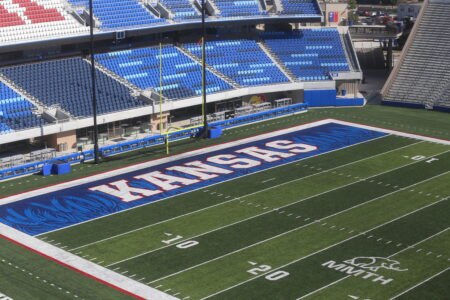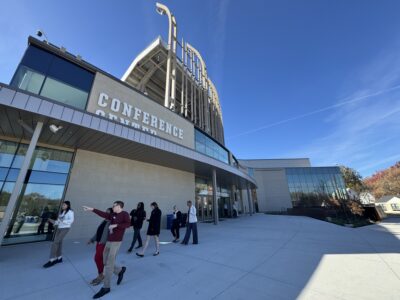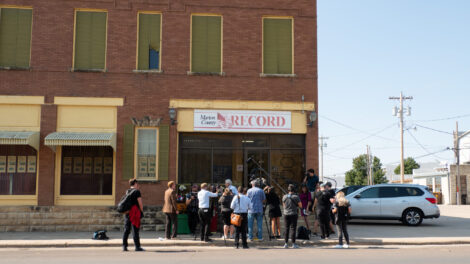Kansas governor signs budget bill with dozens of line-item vetoes; Senate rejects all of them in a single vote

photo by: Sherman Smith/Kansas Reflector
Democratic Gov. Laura Kelly signed the Republican-led Legislature's large budget bill after issuing dozens of line-item vetoes and recommending lawmaker revisit the blueprint before adjourning the 2025 session.
TOPEKA — Gov. Laura Kelly made an end-of-session plea to the Kansas Legislature this week after signing a massive state budget bill — and vetoing more than 35 provisions that she characterized as earmarks, power grabs or financial missteps.
Kelly, who has often used her veto pen in disputes with House and Senate Republicans since taking office in 2019, said she was concerned the budget endangered the state’s long-term fiscal health and could jeopardize funding for essential programs and services that mattered the most to Kansans. She said it was unwise for GOP leadership in the Legislature to adjourn the annual session before the release of updated revenue reports that would evaluate the budget’s financial implications.
“This budget will put Kansas in the red by fiscal year 2028,” Kelly said Wednesday in a message to the Legislature. “Given the ongoing economic uncertainty we are experiencing, I urge the Legislature to seriously consider revisiting this budget.”
She said Kansas demonstrated financial resilience during the past seven years after enduring damaging tax and spending decisions under a previous governor. She repeated a warning to not ignore the history of careless decisions leading to deep cuts, unnecessary debt and higher taxes.
“We risk losing all of that progress and returning to the dark days of four-day school weeks and crumbling roads and bridges if we don’t correct the structural imbalance we are currently facing,” the governor said.
After Kelly’s flurry of line-item vetoes, the Kansas Senate rejected all of them in a single vote on Thursday.
Good news … right thing
There were some portions of the budget that Kelly said she was enthusiastic about, including provisions on water resources, child care and economic development.
Kelly praised a $6 million allocation to safeguard Kansas’ water supply, a $1.75 million increase in matching funds for local conservation districts and $3 million for a pilot project to manage sedimentation in John Redmond Reservoir.
She thanked the Legislature for $50 million invested in the state’s aviation industry, because those commitments would continue “the state’s historic success” in economic development. And she also praised the allocation of $1 million to create rural remote workspaces and investments to attract innovative businesses in cybersecurity and biotechnology.
Kelly said the budget appropriately invested in early childhood education while adding $10 million for special education programs in the state’s K-12 public education system. There was $1.25 million to expand rural child care, she said, and she appreciated the $14 million allocation to help people with intellectual or developmental disabilities move off the state’s waiting list for services.
However, the governor said it was troubling the Legislature didn’t address rising health costs by expanding eligibility for Medicaid. Forty states and the District of Columbia have opened that door to billions of dollars in federal funding aimed at lower-income residents without quality, affordable health care.
“Not only will expanding Medicaid make it easier and more affordable for Kansas families to access health care,” she said, “it would also have substantial economic benefits for Kansans.”
She vetoed a provision requiring the state to unenroll and re-enroll people in the Medicaid program at an annual cost of $3.5 million to $4.3 million. She said federal regulations forbid caregivers and parents from being denied Medicaid coverage without an individual review. In addition, the governor said, the concept was a “highly inefficient, administratively burdensome, costly process.”
Education ‘falls short’
Kelly, known as a public education advocate as governor and during her 14 years in the Kansas Senate, said she was disappointed with a collection of budget decisions regarding K-12 schools.
She was critical of the elimination of funding for professional development programs and literacy training for teachers, and she also objected to the “extremely troubling” decision by the Legislature to finance grants for emergency medical equipment in private schools with money that should be applied to public schools. She suggested that this raised questions about whether lawmakers were challenging the Kansas Supreme Court’s ruling in the Gannon school finance lawsuit, which concluded the Legislature violated the Kansas Constitution by inadequately funding schools.
“While I have corrected this via a line-item veto, I remain extremely concerned about the future of education funding in Kansas,” Kelly said. “The Legislature must stop playing games with school finance, especially when it underfunds our public schools and could land the state back in court, relitigating issues we’ve worked to solve in a bipartisan manner.”
The governor also vetoed a budget item that directed school districts to adopt an online curriculum not vetted by the Kansas Board of Education. Constitutional authority for curriculum decisions rests with the elected 10-member state Board of Education, she said.
Power grabs
Kelly vetoed an appropriation of $3 million to the state treasurer, rather than to an executive branch agency, for a “pregnancy compassion awareness” program. Her veto message recalled the August 2022 statewide vote that affirmed a constitutional right to abortion in Kansas.
“I continue to believe that housing the pregnancy crisis center program in the office of the state treasurer is inappropriate and simply politically motivated,” the governor said. “Kansas women facing unplanned pregnancies deserve meaningful support from medical professionals who can provide evidence-based guidance, not from largely unregulated pregnancy resource centers.”
In addition, Kelly vetoed a provision that would create a workforce expansion program in the office of the state treasurer. She called it an “unvetted program with no guardrails” and said it was inefficient for the Legislature to defund an existing workforce program, “Love, Kansas,” in the Kansas Department of Commerce.
Kelly also vetoed a provision in the budget that would have increased the cost of office space for journalists in the Capitol.
“This item appears to be targeted at the Kansas Capitol press corps to stymie their ability to effectively report on the actions occurring in the people’s house,” the governor said. “Provisions like this set a dangerous precedent and undermine one of the core principles enshrined in the U.S. Constitution.”
Earmarks
Multiple provisions that Kelly vetoed were things that she characterized as earmarks and funding for special interests.
One of these was for an agency in Lawrence — the O’Connell Children’s Shelter. Kelly said she couldn’t allow the Legislature to approve $1 million in funding for the organization. She said it circumvented established methods of awarding grants that would include rigorous review of qualified applicants.
“We have made great progress towards eliminating ‘no-bid contracts’ recently,” Kelly said. “We should not take an unnecessary step backwards.”
Kelly also vetoed a provision that would require the state Department of Commerce to devote $500,000 to Wichita State University’s aviation research institute to work on unmanned aircraft systems and $500,000 to the Salina campus of Kansas State University to develop a commercial credentialing process for drones.
“The Department of Commerce did not request this item and it did not go through the agency vetting process,” she said. “I cannot ignore the deficiencies in the process that led to this being included in the budget.”
The governor vetoed $750,000 for a feasibility study on launching a dental school at Wichita State. She urged higher education and dentistry professionals to collaborate on a strategy for starting the school and present it to the Legislature in 2026.
And she vetoed $500,000 to the Kansas Bureau of Investigation for a DNA analysis system to identify human remains. The KBI didn’t request the funding through the normal appropriations process, the governor said.
Kelly also deleted a plan calling on the Kansas Highway Patrol to collaborate with a third-party entity to build an aircraft hangar in Wichita that would be leased by the state. And she vetoed “poorly written” provisos directing the state Department of Health and Environment to spend not less than $250,000 on preventing transmission of tuberculosis and a separate requirement that KDHE spend up to $96,000 to control tuberculosis. A $263,000 earmark for cerebral palsy research, not requested by KDHE, was vetoed because “intent behind this budget proviso is unclear,” the governor said.
Senate’s override maneuver
After the governor made her line-item vetoes, the Senate deployed an extraordinary maneuver on Thursday to reject them all with a single vote.
Despite protests from Senate Democrats, Senate President Ty Masterson of Andover moved to vote on the vetoes all at once — though he acknowledged the House might not follow the Senate’s lead, and could take the traditional process of addressing each of the 39 vetoes one at a time or in small bundles.
“The budget had a plethora of line-item vetoes,” Masterson said. “I’m going to make a global motion … to override all the line-item vetoes in Senate Bill 125 at one time. That doesn’t mean the House is going to do the same thing.”
Initially, the vote stood at 26-14, or one vote shy of the two-thirds majority needed to override Kelly. Then, four Republican senators — Caryn Tyson of Parker, Stephen Owens of Hesston, Brenda Dietrich of Topeka and Elaine Bowers of Concordia — changed their votes to “yes” to complete the override. The final tally was 30-10.
Senate Minority Leader Dinah Sykes of Lenexa said this was another example of legislative leadership trying to limit bipartisan debate on public policy issues, something she said was a theme of the 2025 session.
“This is just fitting,” Sykes said. “This is a culmination of a condensed and rushed session. We are just amplifying what the public hates about politics and legislation. The ugliness that everyone hates — that’s what we just agreed to.”
— Tim Carpenter reports for Kansas Reflector.




